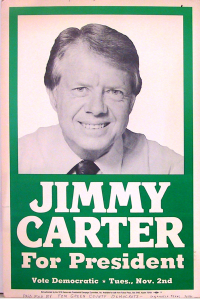
I just didn’t know how much.
While the 1970s represented the rise of oil, the 2010s represent its twilight.
The 70s were marked by two key crises, in 1973 and 1979, during which supplies were cut and prices skyrocketed.
The 2010s have already seen one price collapse, in 2014. It is going to see another before the decade is out.
It is against this backdrop that I would like to revisit the administration of Jimmy Carter. This time, especially if you’re a liberal, try to imagine yourself in opposition.
This isn’t difficult for me, because I began the 1970s as a genuine conservative activist. My politics shifted left, slowly, during the decade, but I still voted for Gerald Ford in 1976, and still refused to support Carter in 1980. (Sorry, Jimmy.)
What conservatives saw during that decade was just what liberals see today, in reverse. In the 1970s conservatives saw a natural majority growing, with power tantalizingly out of reach. Democrats in 1977 held all branches of government, as Republicans do now, and were very optimistic about putting their program into motion.

More important, the Carter people believed they could beat the dominant industry of their time, which was the oil industry. I lived in Houston for most of the decade, and saw the battle from behind oil’s lines. While the rest of the country suffered with “stagflation,” Houston boomed, as I witnessed the skyline change from my Rice University dorm room, and behind the wheel of my 1964 Chevy driving down the West Loop past the Galleria area.
If you live near San Francisco, you’re seeing something similar. Trump hacked the Internet and believes he can control the resource your employers helped create. From Palo Alto, this is laughable. While flyover country has stagnated, you’re watching Apple complete its Spaceship campus, and new headquarters go up for Facebook, Google and others. Real estate prices have grown ridiculous, as they did in Houston back then.

Something was happening back home as well. Parents who had broken with us politically over Vietnam were slowly changing their political view. Many were taking the same political journey Frank Sinatra did, from singing JFK’s “High Hopes” theme in 1960 to becoming “chairman of the board,” aging in tuxedos and attacking “the kids” from behind martinis.
At the same time, Carter’s right-wing opponents were becoming emboldened. Without the burden of making policy, they created causes out of whole cloth, the religious right and the sagebrush rebellion both happening during the late 1970s. Many were secretly funded by oil interests. Even while Carter tried to find a political center, the Republican Party was shifting to the right.
The same thing is happening today, only in reverse. Bernie Sanders should have been the nominee in 2016, just as Ronald Reagan should have beaten Gerald Ford 40 years before. Hindsight is 20-20.

Baby boomers are also changing. We are cashing checks for Social Security, transitioning off insurance into Medicare, and frankly we’re scared. The lavish Florida retirements of our parents look impossible to us. We’re more likely to be aging in place. More of us see Republican cost-cutting as a threat to our very lives.
Interdependence is the coming thing, as individualism was 40 years ago, and we feel the climate changing before our eyes. We don’t like it. Dystopia has replaced utopia in fiction, and we wonder if there is any way forward. We look at our grandchildren and shake our heads, fearing for their future.
Oil becomes the economic fulcrum for what comes next.

In economic terms this is a fantasy. Right now, increased drilling on private lands by U.S. frackers is sending the price of oil on the world market down. The oil industry’s profits from increased supply is reduced, its ability to control the market restricted by the refusal of Middle East producers to cut back. It’s hard enough to sustain current cutbacks. West Africa’s need for growth capital, the re-entry of Libya and Iraq onto the world market, and growing Iranian supplies all put a thumb down on prices.
Meanwhile, renewable energy hasn’t gone away. China is installing solar and wind power as fast as it can, and efficiency continues to grow. Even replacing yesterday’s gas guzzlers with new gas guzzlers has the perverse effect of reducing oil demand, unless those new gas guzzlers are driven a whole lot more than the old cars ever were. Oh, and there’s Tesla, plus plans by every major car company to ramp up production of electrics.

The political implications are clear to anyone with eyes to see. Trump is an accident, a passing phase, and his plans for power will destroy not only him, but the Republican Party, at least to the extent that Reaganism destroyed Democrats.
All Democrats need is a candidate. That’s the easy part.











“Easy part”? A Hillary victory would’ve let Tim Kaine take over in 2024, and that would’ve given them time to nurture a new generation. Now what?
Remember, the Dems held onto the House all through Reagan’s term, taking back the Senate as well in 1986. Reagan’s victory didn’t “destroy” Democrats as much as it made them too fearful for their own good (to say nothing of driving them a little crazy).
“Easy part”? A Hillary victory would’ve let Tim Kaine take over in 2024, and that would’ve given them time to nurture a new generation. Now what?
Remember, the Dems held onto the House all through Reagan’s term, taking back the Senate as well in 1986. Reagan’s victory didn’t “destroy” Democrats as much as it made them too fearful for their own good (to say nothing of driving them a little crazy).
informative.
informative.
Jeff: I get it. But you’re looking at this from your own political perspective. Look from above, not at left or right, right or wrong, but with an eye toward the center. It looks different.
So does our time. Carter ran further to the left than America was willing to go, and Democrats paid the price of a generation. Now Republicans have done the exact same thing, and will pay in the exact same way.
Jeff: I get it. But you’re looking at this from your own political perspective. Look from above, not at left or right, right or wrong, but with an eye toward the center. It looks different.
So does our time. Carter ran further to the left than America was willing to go, and Democrats paid the price of a generation. Now Republicans have done the exact same thing, and will pay in the exact same way.
I’m not so sure. I don’t think Carter lost because of his policy outlook–remember, he held off on health-care reform in his first term and was challenged from his left by Ted Kennedy in the 1980 primary. I think Reagan won because he was able to get voters on his side, and having done so, to articulate a clear direction that it seemed hadn’t been tried at a time when it seemed no one else knew any way out of the situation America was in. Reagan won more than Carter lost, and in the process he was able to hang Carter like an albatross around all politics left of center. Maybe the right Dem candidate can do that in 2020 with all politics right of center, but unless it’s Elizabeth Warren, I still can’t see who that candidate is.
I get the “mirror image”/cyclical-history perspective, and I do think it’s valid to an extent. But I think that if he’d come through (in particular, if he hadn’t had such an annus horribilis of a re-election year, from the Iran hostage crisis onward), the American people would’ve been happy to re-elect Carter in 1980.
I know, I know–suit myself! 😉
I’m not so sure. I don’t think Carter lost because of his policy outlook–remember, he held off on health-care reform in his first term and was challenged from his left by Ted Kennedy in the 1980 primary. I think Reagan won because he was able to get voters on his side, and having done so, to articulate a clear direction that it seemed hadn’t been tried at a time when it seemed no one else knew any way out of the situation America was in. Reagan won more than Carter lost, and in the process he was able to hang Carter like an albatross around all politics left of center. Maybe the right Dem candidate can do that in 2020 with all politics right of center, but unless it’s Elizabeth Warren, I still can’t see who that candidate is.
I get the “mirror image”/cyclical-history perspective, and I do think it’s valid to an extent. But I think that if he’d come through (in particular, if he hadn’t had such an annus horribilis of a re-election year, from the Iran hostage crisis onward), the American people would’ve been happy to re-elect Carter in 1980.
I know, I know–suit myself! 😉
When you look in a mirror, left is right and right is left. We tend to look at what we see as it is, not as its reflection. Probably why no one else has written about Trump as Carter.
When you look in a mirror, left is right and right is left. We tend to look at what we see as it is, not as its reflection. Probably why no one else has written about Trump as Carter.